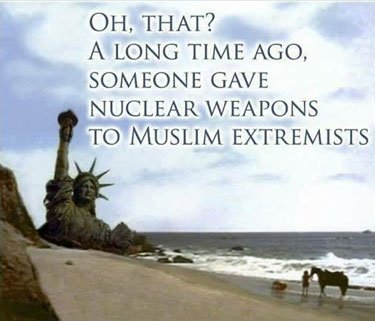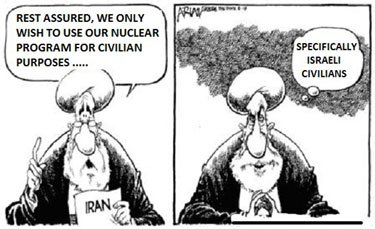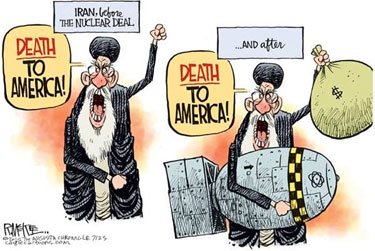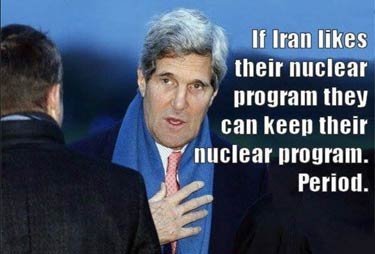Category Archive 'Iran Nuclear Treaty'
13 May 2018

Gateway Pundit:
Iran’s Foreign Ministry Spokesman Hossein Jaberi Ansari warned Western officials this week that if they do not put pressure on the Trump administration the Iranian regime will leak the names of all Western officials who were bribed to pass the weak deal.
———————————-

06 Sep 2015


Andrew McCarthy, in NR, explains that, not only can the Republican majority in Congress stop Barack Obama’s Iran Treaty, on the basis of the terms of last April’s Constitution-reversing Corker Bill, Congress is obliged to.
While maddening, the Corker bill is not an abject congressional surrender to Obama and Tehran. It is a conditional surrender. It would grant Obama grudging congressional endorsement of the deal in the absence of a now unattainable veto-proof resolution of disapproval, but only if Obama fulfills certain basic terms. Obama has not complied with the most basic one: the mandate that he provide the complete Iran deal for Congress’s consideration. Therefore, notwithstanding Washington’s frenzied assumption that the 60-day period for a congressional vote is winding down, the clock has never actually started to run. Congress’s obligations under Corker have never been triggered; the Corker process is moot. …
The Corker legislation — formally known as the Iran Nuclear Agreement Review Act of 2015 — is crystal clear. In its very first section, the act requires the president to transmit to Congress “the agreement. . . . including all related materials and annexes.†It is too late to do that now: the act dictates that it was to have been done “not later than five days after reaching the agreement†— meaning July 19, since the agreement was finalized on July 14. Underscoring the mandate that all relevant understandings in the Iran deal — including, of course, the essential understandings — must be provided to lawmakers, the act explicitly spells out a definition of the “Agreement†in subsection (h)(1). Under it, this is what the administration was required to give Congress over six weeks ago in order to trigger the afore-described Corker review process:
The term ‘agreement’ means an agreement related to the nuclear program of Iran . . . regardless of the form it takes, . . . including any joint comprehensive plan of action entered into or made between Iran and any other parties, and any additional materials related thereto, including annexes, appendices, codicils, side agreements, implementing materials, documents, and guidance, technical or other understandings, and any related agreements, whether entered into or implemented prior to the agreement or to be entered into or implemented in the future.
The act could not be more emphatic: To get the advantage of the favorable Corker formula that allows him to lift the anti-nuclear sanctions with only one-third congressional support, the president was required to supply Congress with every scintilla of information regarding verification. …
It is not enough to say that Congress has no obligation to proceed with the Corker review process. It would, under the act, be impermissible for Congress to do so.
Read the whole thing.
Of course, the sad reality is the Mitch McConnell and John Boehner are conscious that democrats are wilier and more determined than they are, and have, in everything, the backing of the national media. They have a majority of both houses of Congress and polls show that two thirds of the public opposes the Iran Deal, and they still won’t fight.
15 Jul 2015

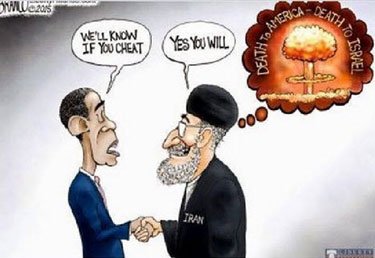
John Hinderaker explains why Obama’s Nuclear Agreement is a great deal for the Iranians.
[W]hat does Iran get?
First, and most important, it gets in excess of $100 billion in currently-frozen assets. This will happen in the near future, on or about the agreement’s Implementation Date. I think this prospect is what is making Iran’s leaders so jubilant. With that money, they can step up their support for allies in Syria, Yemen and Iraq, and their support for terrorism everywhere. (By way of perspective, the entire United States military budget for the current fiscal year is only $560 billion.) To the extent that they spend some of it at home, it will help cement their position domestically.
Second, the agreement grants Iran international legitimacy. Since the revolution of 1979 and the seizure of America’s embassy in Tehran, Iran has been treated as a rogue state. Under the agreement, that status comes to an end. Investment in Iran will be permitted and likely will flourish. Sanctions will be removed and Iran’s nuclear program will not only be tolerated, it will be explicitly recognized and to some degree supported by the international community. The agreement contemplates that upon implementation, “the Iranian nuclear programme will be treated in the same manner as that of any other non-nuclear-weapon state party to the NPT [non-proliferation treaty].†It is hard to overstate how important this legitimacy is to the regime.
The third benefit to Iran’s rulers is perhaps the most important, and is closely linked to the first two. The agreement guarantees that, at least for the foreseeable future, the mullahs will remain in power. Realistically, the only way Iran could be denied a nuclear arsenal in the long term is through regime change. Early in the Obama administration, that seemed like a plausible scenario, but the administration declined to aid, or even encourage, anti-regime forces when such support might have made a difference. Now, with the mullahs both flush with cash and blessed with international legitimacy, their grip on power is probably stronger than ever. Nuclear weapons will follow, sooner or later, at a time of the regime’s choosing. And in the meantime, Iran’s ability to make mischief in the Middle East and around the world (e.g., through its newfound alliance with Venezuela) has been greatly enhanced.
Your are browsing
the Archives of Never Yet Melted in the 'Iran Nuclear Treaty' Category.
/div>

Feeds
|



